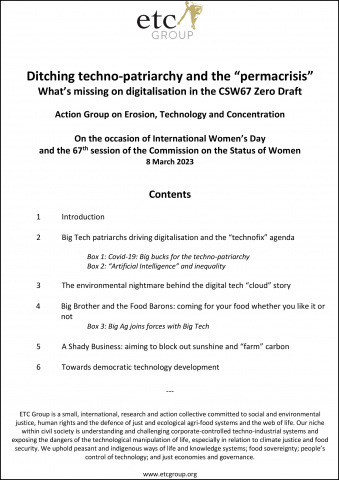Submitted by Ronnie Hall on
As CSW67 turns its attention to digitalisation, like the rest of the United Nations, this Briefing zooms in on less-discussed aspects of the ongoing digitalisation tsunami, which is likely to usher in a new worldwide wave of gender-based impacts, as the techno-patriarchy, along with Big Ag and other industries, relentlessly dreams up new ways of turning a profit by digitalising as many sectors as possible (often in extraordinarily far-fetched and unnecessary ways).
Technology-facilitated gender-based violence is likely to be exacerbated by the so-far overlooked environmental impacts of digital technologies, such as extensive energy use, water dependence and mineral extraction, all of which result in resource grabbing, marginalisation and the violation of communities’ rights.
The ongoing (but little known) digitalisation of all food and agriculture sectors, from breeding through to retail, is also expected to have extensive gender-based impacts, such as exacerbating land and resource grabbing, displacement of livelihoods and labour, marginalisation of traditional food processing and retailers, and violation of the human rights of farm workers across the world.
Digitalisation is not a panacea to development challenges, nor is it a default route to societal transformation. The intensifying promotion of digital technologies as “technofix” solutions to current global crises around climate change (e.g. in the UN Framework Convention on Climate Change) and biodiversity loss (e.g. in the UN Convention on Biological Diversity) are extremely dangerous false solutions, that distract from and delay real solutions and foster further corporate control, all of which will have further direct and indirect impacts on women and others across the world.
| Attachment | Size |
|---|---|
| 217.7 KB |

